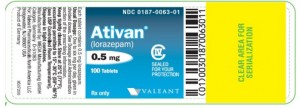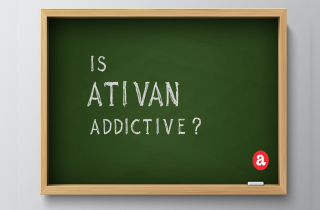TABLE OF CONTENTS
- Addictive Potential
- How Do You Get Addicted?
- Signs of Addiction
- Psychoactive Ingredients
- Main Uses
- Dependence vs. Addiction
- Do I Have a Problem, or Not?
- What Next?
……….
ARTICLE SUMMARY: Ativan is additive. In fact, the main ingredient in Ativan – called lorazepam – is a benzodiazepine that is known to cause physical and psychological dependence. In addition to reducing anxiety and inducing sleep, benzodiazepines can cause euphoria and, therefore, are subject to abuse as recreational drugs. This is why Ativan is a federal controlled substance Schedule IV drug: it can be abused or lead to dependence. In large doses, Ativan can get a user “high.”
The Addictive Potential of Ativan
Ativan, like most benzodiazepines, is very addictive. Doctors try to prescribe Ativan for no more than 3 or 4 months because of the well-known habit-forming potential of Ativan. Still, the Controlled Substances Act rates Ativan as a Schedule IV drug, meaning it has relatively low potential for abuse and addiction. But how addictive a drug is doesn’t just depend on its chemical properties; it also depends on how you’re using it.
Snorting Ativan to get high or taking it with other substsances increase chances of drug addiction. The risk of drug problems also increases with higher doses and longer term use. Further, people with a history of alcoholism or drug abuse or patients with significant personality disorders may want to avoid Ativan altogether. This is because they may be at higher risk for addiction. People who experience depression, psychosis or lung or breathing problems are also warned to avoid the use of Ativan.
The FDA approved label for Ativan suggests that the drug’s dependence potential can be reduced when lorazepam is used at the appropriate dose for short-term treatment of around a few weeks. Further, anxiety or tension associated with the stress of everyday life usually does not require treatment with an anxiolytic like Ativan. For some people, mindfulness practices like meditation and awareness training can help.
How do you get addicted to Ativan?
Addiction is more likely to occur when you smoke, snort, or inject Ativan or if you otherwise take Ativan other than prescribed. People with a past history of drug or alcohol abuse are also at a greater risk of developing an Ativan addiction. Some of the ways that people consciously choose to abuse Ativan include:
- chewing Ativan to release the medication immediately
- crushing Ativan into a powder and snorting it for a quicker high
- crushing Ativan to dissolve in water and inject intravenously
- taking Ativan in higher doses than prescribed
- taking Ativan more frequently than prescribed
Signs of Addiction
It’s true that Ativan addiction and Ativan dependence can be difficult to distinguish from one another. If you take Ativan to cope with everyday stresses and feel you can’t go without it, you may be addicted to Ativan. Other signs of Ativan addiction include:
- Continuing Ativan use or abuse even if it has negative consequences.
- Craving Ativan and using it compulsively.
- Seeking Ativan to get high in order to stimulate the “reward center” of the brain.
Psychoactive Ingredients
 Ativan is an anti-anxiety medication that contains lorazepam, a benzodiazepine. Ativan is generally dispensed in tablet or liquid form, both of which are taken by mouth. It works as a strong tranquillizer to the central nervous system. It is so strong, in fact, that the doctor prescription label for Ativan notes that patients should be warned against operating motor vehicles and dangerous machinery while using Ativan. Further, tolerance for alcohol and other depressants is diminished under the influence of lorazepam.
Ativan is an anti-anxiety medication that contains lorazepam, a benzodiazepine. Ativan is generally dispensed in tablet or liquid form, both of which are taken by mouth. It works as a strong tranquillizer to the central nervous system. It is so strong, in fact, that the doctor prescription label for Ativan notes that patients should be warned against operating motor vehicles and dangerous machinery while using Ativan. Further, tolerance for alcohol and other depressants is diminished under the influence of lorazepam.
Main Uses
The main ingredient in Ativan, lorazepam, is used to relieve anxiety and also to treat severe seizures, insomnia, and muscle spasms. While Ativan is indicated for the management of anxiety disorders or for the short-term relief of the symptoms of anxiety or anxiety associated with depressive symptoms, prescription guidelines indicate that benzodiazepines like Ativan should be prescribed for short periods only, or for about 2 to 4 weeks max.
Still, people use Ativan to get high. In truth, lorazepam works by slowing brain activity. Main effects of Ativan include:
- evelate mood
- induce sleep
- motor incoordination
- provide additional energy
- reduce anxiety from stressful life circumstances
- sedation
But using Ativan to get high comes at a risk. People often achieve these effects when mixing Ativan with alcohol, opioids, or other drugs. However, taking Ativan with other drugs accents and amplifies depressant effects. So mixing Ativan with alcohol or drugs increases the risk of respiratory depression, coma, and death.
Dependence vs. addiction
Most people who take Ativan long-term will develop a physical dependence on lorazepam, but this isn’t the same thing as an addiction. An Ativan dependence causes you to develop a tolerance to the medication’s effects over time. Dependence causes withdrawal symptoms when you cut back on Ativan doses or abruptly stop taking Ativan for good. Common withdrawal symptoms of Ativan include:
- abdominal cramps
- agitation
- anxiety
- confusion
- convulsions/seizures
- depersonalization
- depression
- derealization
- diarrhea
- dizziness
- dysphoria
- hallucinations/delirium
- headache
- hyperacusis
- hypersensitivity to light, noise, and
- insomnia
- involuntary movements
- irritability
- loss of appetite
- myalgia
- nausea
- numbness/tingling of extremities
- palpitations
- physical contact/perceptual changes
- rebound phenomena
- restlessness
- sweating
- tension
- tremor
- vomiting
Ativan addiction may manifest these same symptoms, but MUST also involves a psychological dependence on Ativan. An Ativan addict will experience strong cravings for the drug and compulsively uses lorazepam, despite negative consequences to social, work and home life.
Do I Have a Problem?
Non-medical use of Ativan is the first indicator of a problem. Using drugs to get high or for euphoric effect is an indicator that you could be addicted. Also, when you use Ativan OTHER THAN PRESCRIBED, this indicates a drug problem. Addiction is characterized by four specific (psychological) symptoms.
1. Drug craving.
2. Obsessive or compulsive thinking about a drug.
3. Continued drug use despite negative consequences to home, social, or work life.
4. Loss of control of drug use.
If you have a problem with Ativan, you are not alone. There are ways that you can quit safely, and live a drug-free life!
What Next?
If you think you’ve got a problem with Ativan, you probably do.
In these cases, we recommend that you speak with a trusted person: a doctor, a friend, or a partner. Your next step should be diagnosis. Your family doctor can provide you with a brief screening for addiction, or you can proceed directly to any of the following:
- A licensed addiction counselor, psychologist, or clinical therapist.
- An addiction treatment center.
- A psychiatrist.
- A clinical social worker.
Any of these behavioral healthcare professionals can help you figure out the exact nature and severity of the problem…and chart a course for recovery.
REMEMBER: You are not alone!
Ativan addiction potential questions
Do you still have questions about Ativan addiction potential? Please leave them here. We are happy to help answer your questions personally and promptly. If we do not know the answer to your particular question, we will refer you to someone who does.










Related Posts